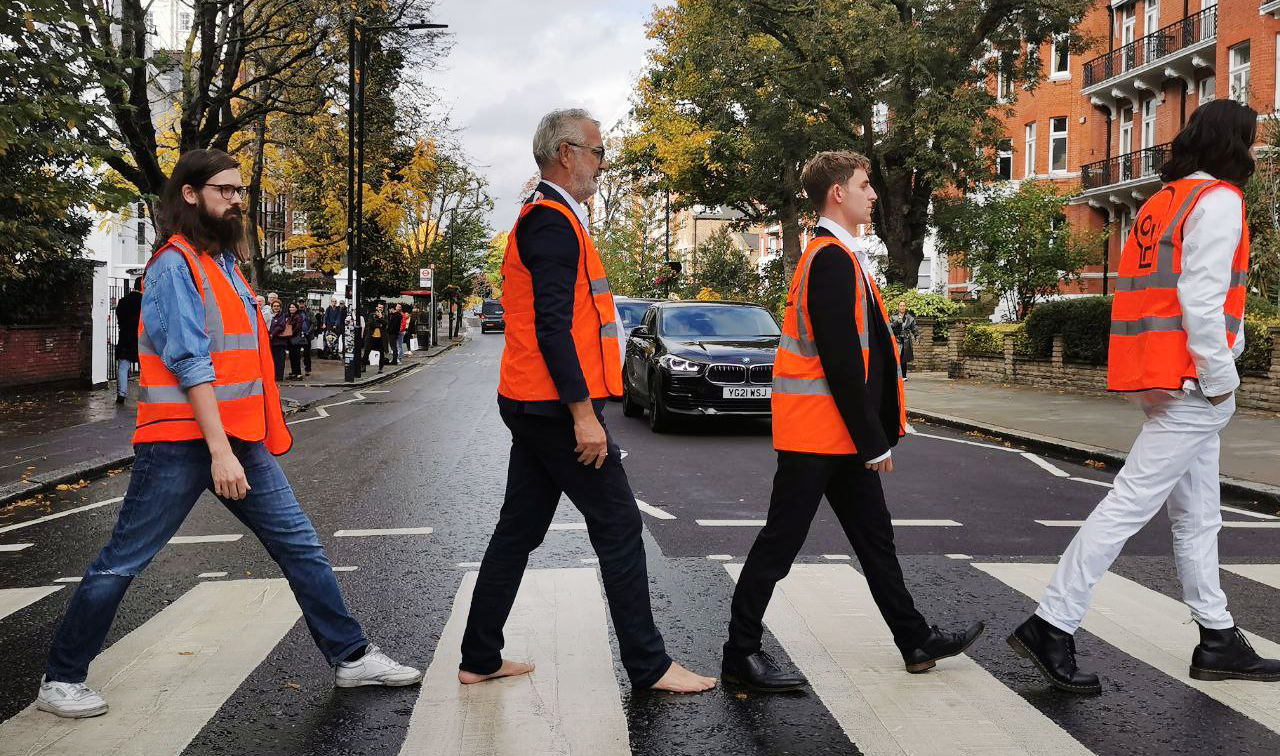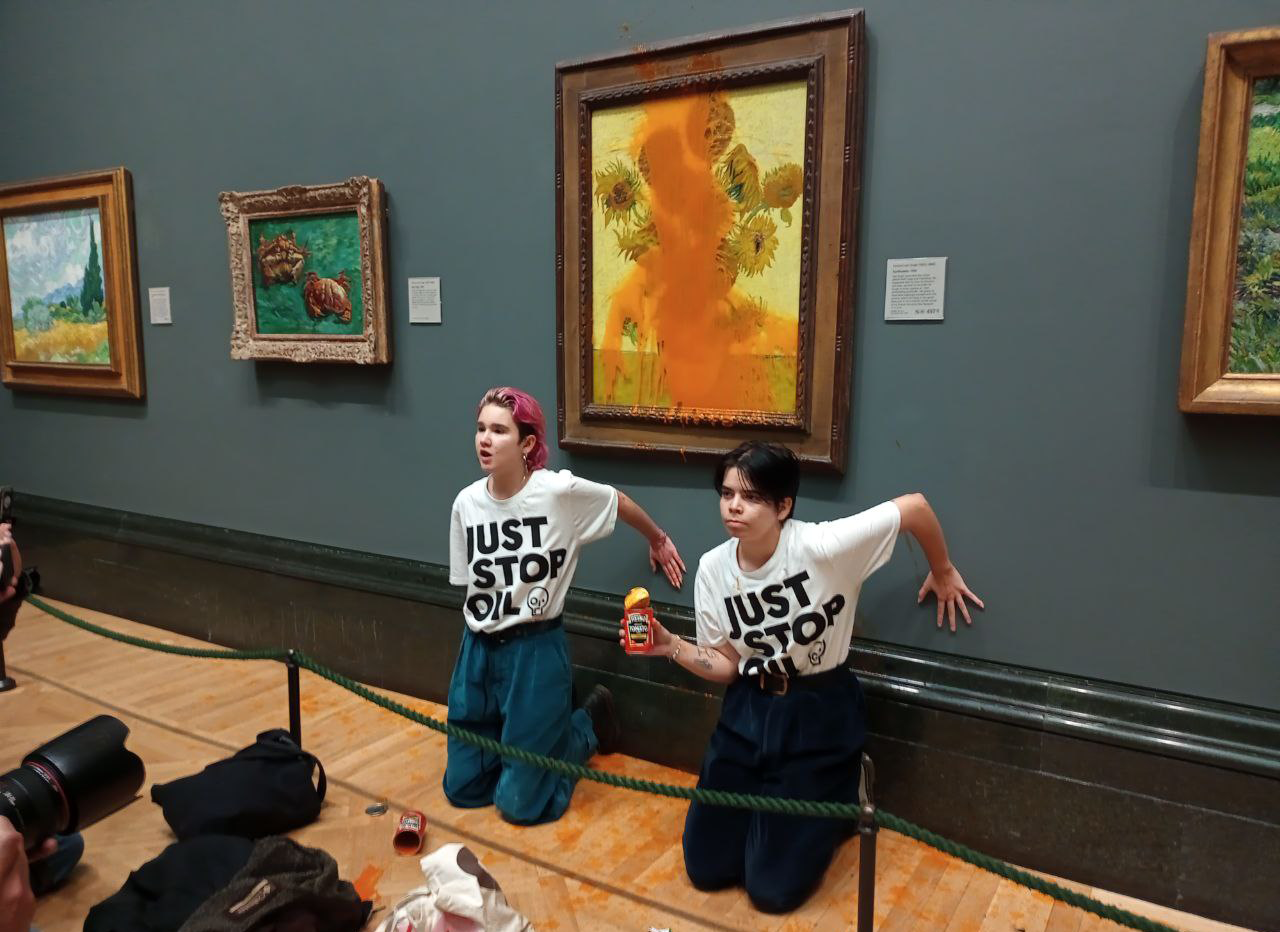How Tomato Soup and Sunflowers Advance the Climate Conversation
October 14: Two protestors throw tomato soup over Van Gogh’s Sunflowers at the National Gallery in London
October 23: Four protestors walk into the road and block traffic with their hands glued at Abbey Crossing
October 23: Two protestors throw mashed potatoes at a Monet painting in Germany and glue their hands to the walls
October 24: Two protestors throw chocolate cake at a Madame Tussauds waxwork model of King Charles III
October 25: Protestors block the road and spray-paint the headquarters for fossil fuels lobbyists and think-tanks that backed Liz Truss
October 26: Two protestors spray orange paint over luxury car dealers, including Bentley, Bugatti, and Ferrari garages in Mayfair
Today marks the 27th consecutive day of environmental activist group Just Stop Oil’s month-long campaign of disruptive climate protests in the UK, which have also inspired other activists across Europe. Hundreds of protestors have been arrested following stunts that have accompanied calls for the UK government to halt fossil fuel licenses. These protests coincide with key reports by the UN, published this month, that claim that it is unlikely that we will meet the 1.5C global warming target, and that any progress on cutting emissions so far has been “woefully inadequate.” At this point, even if the world met all of its 2030 climate goals in time, we are now on track for global temperatures to rise by at least 2.5C, entailing catastrophic climate breakdown.
After the Van Gogh incident, front pages and virtual newsfeeds across the world were plastered with headlines expressing shock and outrage. Some have called the protests performative, alienating, and counterproductive, while others have gone as far as to dub them attention-seeking acts of vandalism that damage valuable art, disrupt public life, and threaten open access to spaces such as museums. Many things can be true at the same time: I believe that there is space for all of these criticisms and more. However, in a media landscape where climate protests rarely make headlines and those in power have incentive to look away, perhaps many have been too quick to condemn groups such as Just Stop Oil.
What does Van Gogh have to do with the climate crisis? This isn’t about Van Gogh, or the Beatles, or Monet. Their art remains untouched, and it’s true, the climate crisis isn’t their fault. However, the fact that Sunflowers remains protected behind glass while Earth faces climate catastrophe brings up the question of our priorities as a species. The protestors have made it clear that they made sure that the paintings would remain unharmed. However, the same cannot be said for the forces that are actively harming our rapidly-degrading ecosystems. There is also no art—and no sunflowers—on a dead planet. And what does it say about us when we care more about paintings about nature than nature itself?
This seems to be a trend; more people reacted with outrage to the Notre Dame going up in flames in 2019 or cake being smeared over the (encased) Mona Lisa in May than millions being displaced and killed by floods in Pakistan and Nigeria these past three months. Not even similar climate protests that have put human life—instead of artefacts or buildings—at risk have had the same response; this April, 50-year old Wynn Bruce burned himself alive on the steps of the Supreme Court on Earth Day, to radio silence. Conversely, Just Stop Oil’s campaign threatens something that society seems to value more: pieces of art. Although this distinction is unsettling to think about, the coalition is clearly attempting to redirect attention to their demands by staging protest in a space where people are already watching.

Performance is at the center of this strategy, because it is clear from past and present climate protests that anything less is rarely enough in this attention economy. I wouldn’t argue that the protests have been supremely persuasive, have actively led to policy change, or have convinced hordes of climate denialists to care. If anything, the messaging might be considered esoteric and unclear if one knew nothing about the group’s demands, which can be dangerous for a social movement. Many critics have also pointed out the missed opportunity for protestors to point out the links between museums, colonial dispossession and violence, and fossil fuel money. I would also refrain from calling these protests revolutionary. In many ways, they exhibit white, middle-class privilege. In addition, Just Stop Oil is partially funded by oil heiress Aileen Getty, who wrote for the Guardian in 2021 acknowledging her family’s role in the climate crisis.
However, all of these are perspectives that prove the success of the protests in at least one arena: starting a conversation and making people feel uncomfortable. Effective protest is rarely well-received, but it is an opportunity for us to sit in our discomfort and explore it. This is not the time to police young people’s anger or discourage the wealthy and powerful from advocating for climate justice. If this is what it takes for the world to talk about climate, then so be it. We must let our discomfort guide us to conclusions that are not reactionary. For the first time in recent memory, a climate-adjacent conversation has gone truly viral and has counteracted our business-as-usual mentality. What does this anger, outrage, skepticism, and disappointment reveal about what we hold dear, and are we capable of nuanced and productive debate?
Therefore, the problem is not the group’s protest tactics, but our next steps. Now that the news cycle has been disrupted, this opportunity must be used to amplify activists and affected groups in the Global South and in marginalized communities, who face much direr consequences of protest and the climate crisis on the daily. In an ideal world, groups like Just Stop Oil would call attention to these issues on their own. While it remains to be seen if they will engage in this sort of intersectional activism, the rest of the world must leverage the momentum that they have created. We must channel our energy into demanding that our leaders defund fossil fuels, invest in climate mitigation and adaptation, and prioritize vulnerable groups. This unprecedented wave of emotion and attention is a chance to focus on what really matters, because Just Stop Oil’s stunts have been exactly that: stunts. They are simply red flags being waved, signaling that there is urgent work to be done and systems of climate colonialism to be dismantled. Will we seize the moment, declare a climate emergency, and take action, or will the world scoff and move on to the next attention-grabbing news item?
Photo by Just Stop Oil
Written by Syeda Mahnoor Raza (’24)

